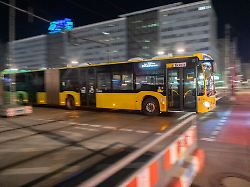Almost all federal states affected
Strike week has started in local transport
February 26, 2024, 10:06 a.m
Listen to article
This audio version was artificially generated. More info | Send feedback
Germany’s buses are at a standstill again this week – after a union call, drivers are stopping their work again. The strike has already begun in Saarland, Schleswig-Holstein and Berlin. Other federal states are expected to follow suit by the main action day on Friday.
The wave of warning strikes announced by Verdi in local public transport began on Monday with strikes in bus transport in Saarland and the Trier region. The municipal transport companies in Saarbrücken, Saarlouis, Völklingen and Neunkirchen are initially affected, as the union announced. According to company information, the Saarbahn is also on strike. In Rhineland-Palatinate, employees at the DB Regio Bus Mitte location in Mehren and at the MB Moselbahn locations stopped working. As a result of other collective bargaining disputes, there were also restrictions on local transport in Schleswig-Holstein and Berlin.
Verdi has announced industrial action in all federal states except Bavaria from Monday to Saturday – regionally on different days. The main strike day is Friday. Bavaria is the only federal state not affected. Parallel to the warning strikes, Fridays For Future is organizing numerous demonstrations against the climate crisis on March 1st.
In collective bargaining, Verdi wants to achieve better working conditions for the approximately 90,000 public transport employees in over 130 municipal companies – for example through fewer weekly working hours, more vacation or additional relief days for shift work and night work. In addition to the introduction of a 35-hour week, the union is calling for shift length to be limited to a maximum of ten hours. A minimum rest period of twelve hours is also required. The union justified the warning strike in Saarland with an inadequate offer from the employers.
Only individual train cancellations in Berlin
Meanwhile, in Schleswig-Holstein, a five-day warning strike began at private bus companies this morning. Verdi also called for this. The union initially assumed that there would hardly be any reliable bus transport in rural areas. Urban traffic in Kiel, Lübeck, Flensburg and Neumünster is not affected. In the morning, Verdi estimated the failures at around 85 percent. The North Bus Association, on the other hand, assumed that at least half of the bus drivers were on duty.
At the Berliner Verkehrsbetriebe (BVG), passengers had to wait longer for buses. According to the company, individual trips on subways and trams were canceled. The reason is a warning strike called by the NahVG, GKL and civil service unions from the start of the shift at 3 a.m. The strike is expected to end around 2 p.m. The unions have also called for a demonstration in front of the House of Representatives. Verdi will call for a strike in the capital on Thursday and Friday.
Most S-Bahn trains in Germany are not affected. They are usually operated by Deutsche Bahn, which is currently negotiating new collective agreements with the train drivers’ union GDL, not with Verdi.
At the beginning of the month, Verdi had already paralyzed public transport in almost all of Germany with a labor dispute. “The signal that the employees sent with their strike on February 2nd was apparently not sufficiently understood,” criticized Verdi deputy chairwoman Christine Behle. Because the collective bargaining talks in the individual federal states still had no result. “In order to finally bring movement into the negotiations, pressure must now be put on the employers again,” emphasized Behle. So far they have not signaled any concession. This means that – except in Bavaria – another strike is unavoidable.
